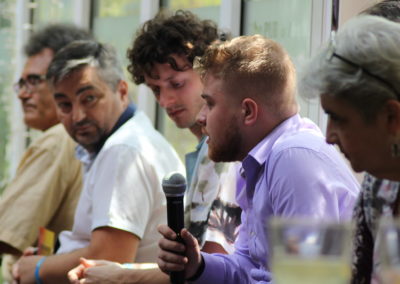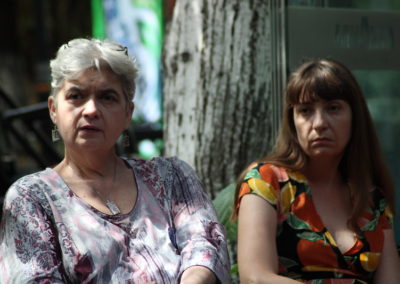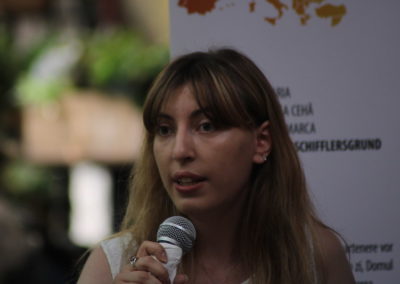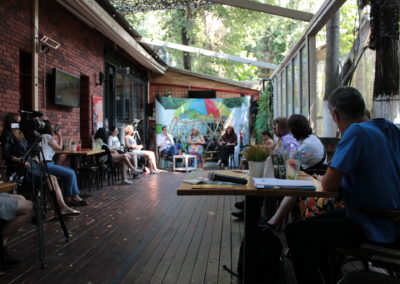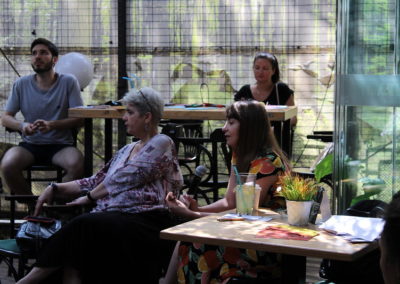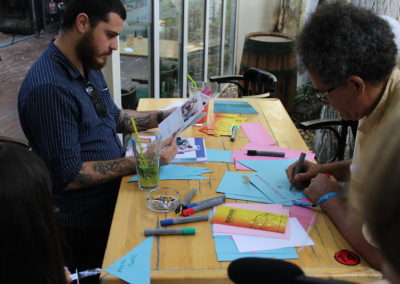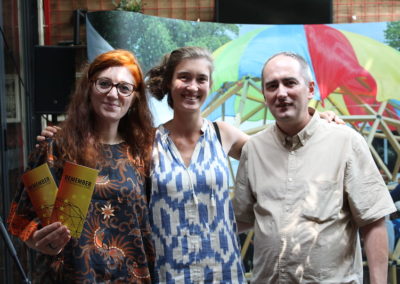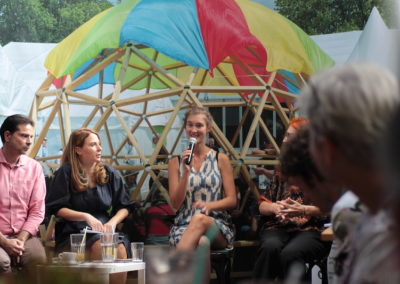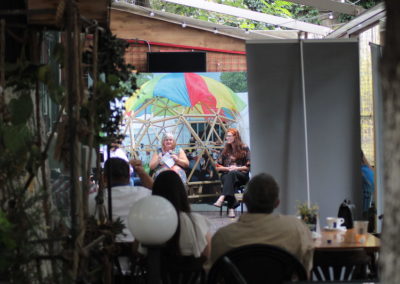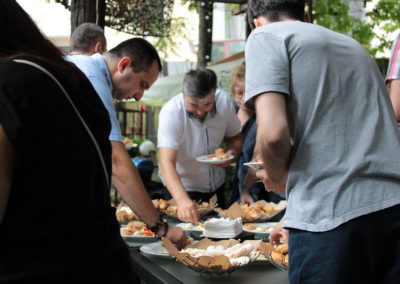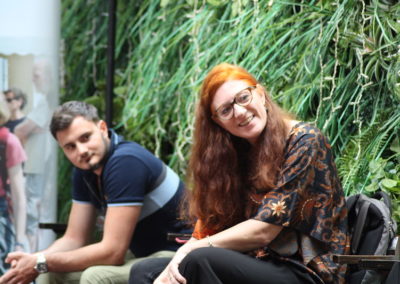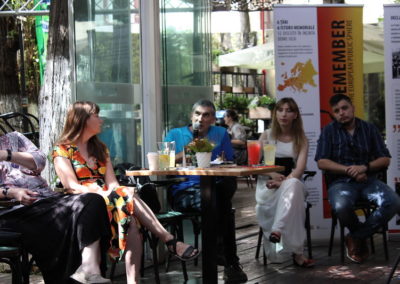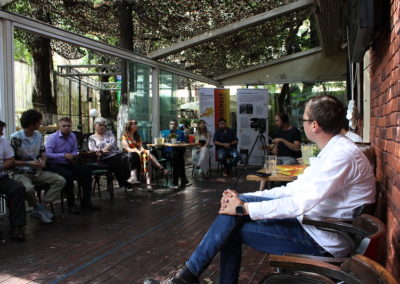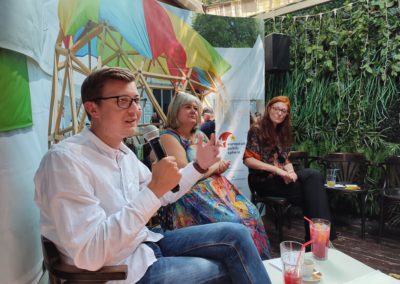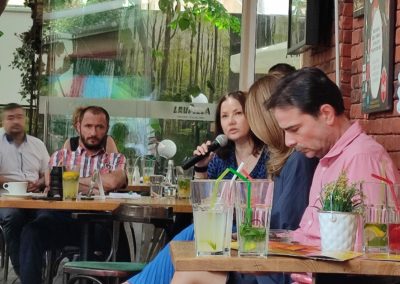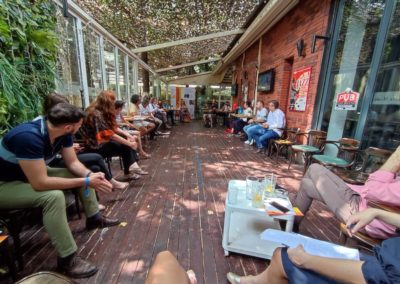A day to remember for Romanian citizens at Bucharest’s historical Kilometre 0 of Democracy
The second stop of the Remember Tour was Bucharest, a city with a lot of history, with new opportunities and challenges for its citizens. The event took place right at Bucharest’s historical Kilometre 0 of Democracy in University Square. What other place is more suitable for a democratic discussion? Our local supporter Georgiana Marcu shares her impressions and also provides on overview of the place of remembrance University Square at the bottom of this page!
People tried to be involved as much as they could in the political brunch, because it is one way to change something in a democratic state. Another way is to wait for others to bring about change and sometimes this can take quite a while.
On July 24, in the morning, we met with the whole team and together with our local partner organisation Asociatia Pro Democratia. With the volunteers and other people involved we started to arrange the place at The Pub Universitatii and waited for our guests.
On a sunny and beautiful Saturday, more than 40 people chose to spend more than 3 hours in our company and together we discussed during a political brunch about the future of Europe, the state of democracy and also the role of media.
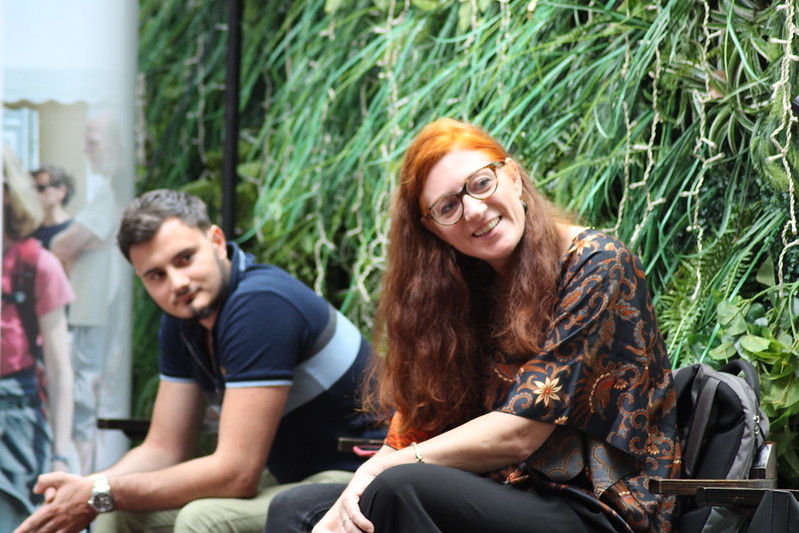
Our local partner Iuliana Illiescu from Asociatia Pro Democratia
Many of the participants were citizens involved, with a lot of knowledge about democracy and how it should work. They are dedicated to their work and believe that involvement in the community is essential for a prosperous and happy life. They had different backgrounds, but the reason that they chose to be involved in the project is the same: the desire to build a better democracy in Romania and also the desire to turn the bad into some good in their country.
Some of the relevant things that our participants discussed during the event: legislation, politics, direct democracy, voting for change, collective attitude, improving communication and information processes in urban and rural areas about and by the EU, solidarity between all ethnicities, double standards, East and West, education, and the spillover effect of public debates.
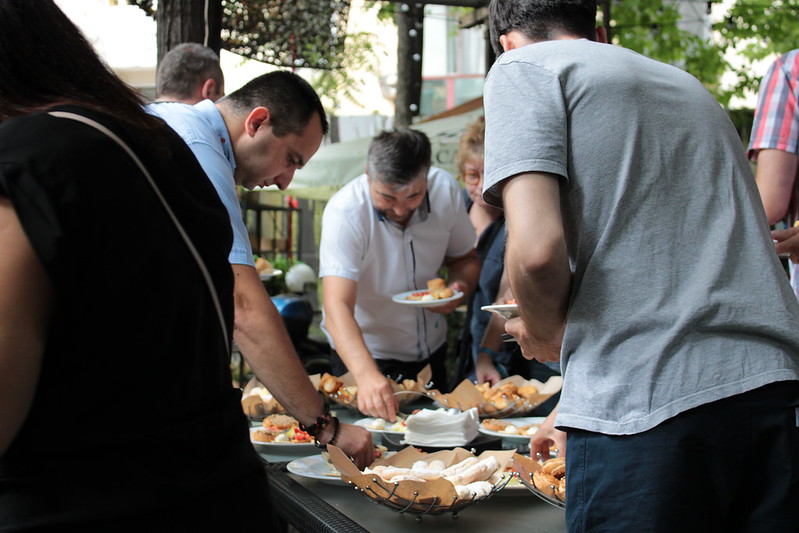
Discussing over a bite at the political brunch
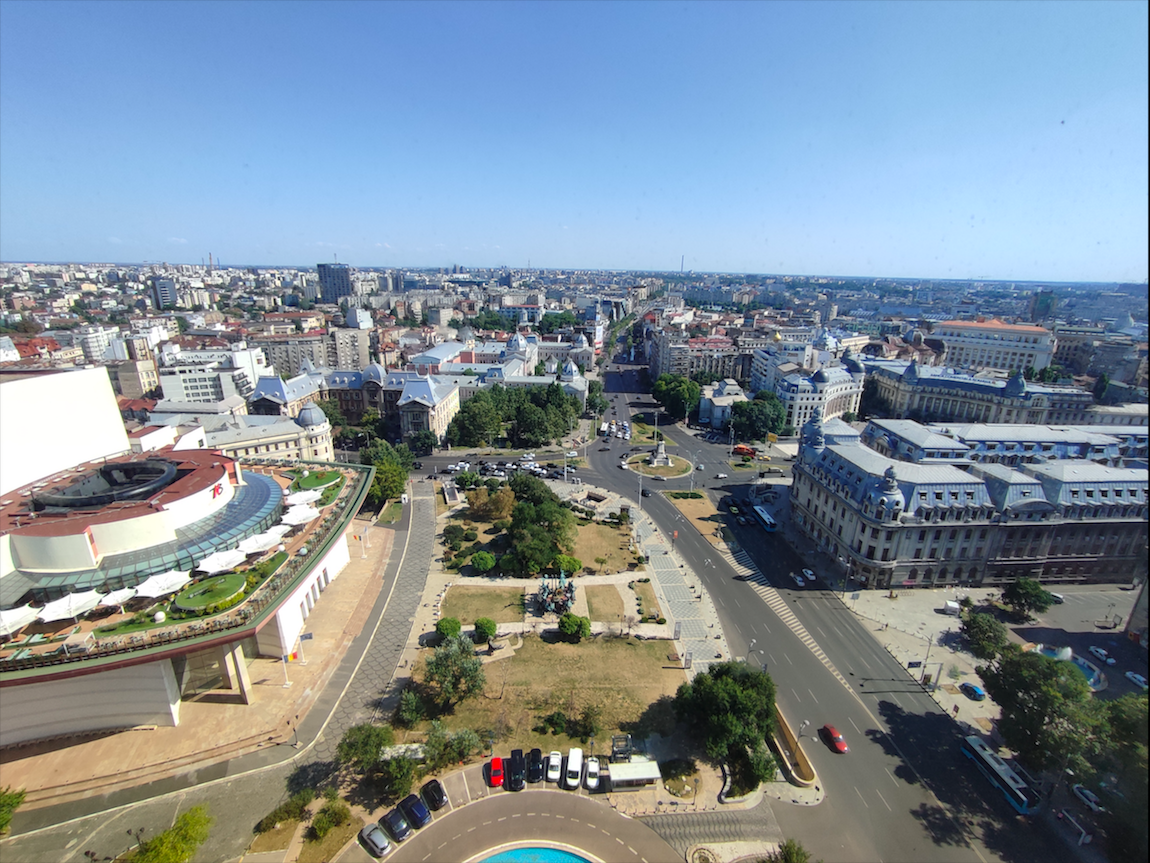
University Square – that day without any demonstrations
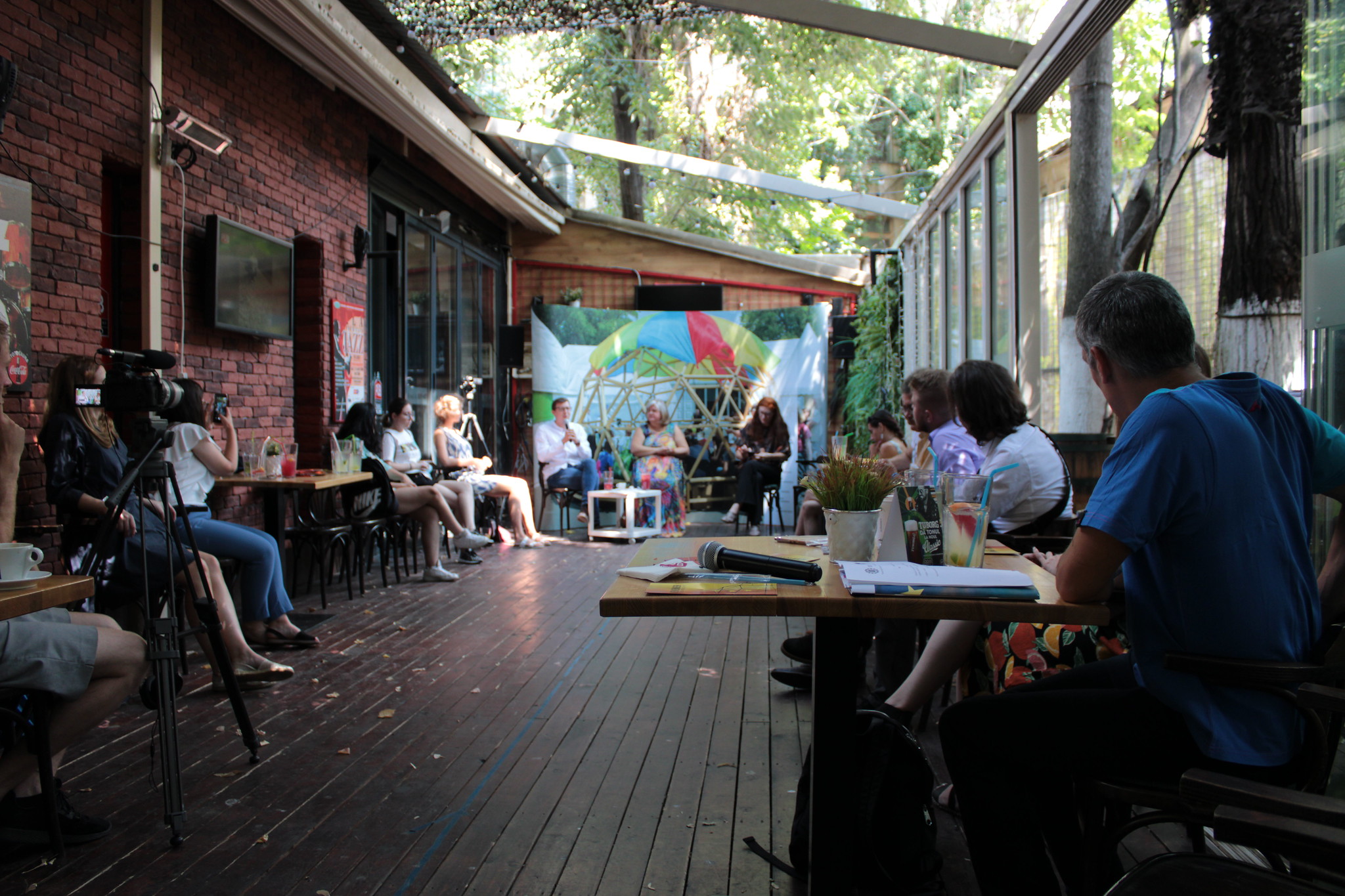
Our second discussion at Bucharest’s Kilometre 0 of Democracy
Instead of concluding, we want to leave here some thoughts, ideas, encouragement from our guests, which we hope will guide you in the work you will do in your own community:
”Our generation has the power to build a consolidated society. We are the change that we want to see in the world.”
”Politicians are stewards that must be at the service of democracy and the citizenry.”
”When people’s democratic demands are not heard, constrained voices turn into social mobilisation.”
”A stable democracy must be nurtured by citizen-centered empowerment and accountability.”
Remember Tour – The future of Europe in #Bucharest was an event organized within the Remember Tour – European Public Sphere project in order to create a dialogue framework through which citizens and other actors in society are invited to express their opinions and ideas on how they would want to shape Europe in the future.
Georgiana Marcu on University Square as our place of remembrance:
In Romania, the post-communist transition was hampered by the fragility of the democratic tradition, which, although dated from the second half of the century. In the 19th century, it was brutally interrupted by the establishment of a series of right (1938–1944) and left (1945–1989) dictatorships. Of all the countries covered by the revolution in 1989, Romania was distinguished by the degree of persistence of certain neo-authoritarian mental, institutional and political forms that were perpetuated after the disappearance of totalitarianism. If we accept the concept of “post-totalitarianism” —as formulated by Václav Havel (The Power of the Powerless), Ágnes Heller, Ferenc Fehér, and György Márkus (The Dictatorship of Needs) —as a phase of the decomposition of communist regimes in the former Soviet bloc, then Romania was the exception, insofar as the dictatorship of Nicolae Ceausescu symbolized the radicalization of the political system. This perspective may explain both the violent end of dynastic communism and the spasmodic birth of the regime that followed.
The University Square phenomenon was born in this climate of post-revolutionary uncertainty. It is a post-communist context that the Polish political thinker Leszek Kołakowski (the “philosopher of Solidarity”) saw disturbed by tenacious Leninist legacies, which he called – referring to the transformation of the old elites and the persistence of ideological and cultural relics of the old regime – “moving ruins”.
Romanian civil society was diffuse, precarious and fragile in the 1980s, while the “uncivil society” (Nomenclature) had grown exponentially as part of the institutional elephantiasis of the Ceausescu autocracy. December 1989 made the most aberrant features of the old regime disappear, including the dictatorial couple, but of all the great political upheavals of that 1989 annus mirabilis, the Romanian Revolution was the only one accompanied by nationwide violence and bloodshed (over 1,000 dead). Much of the history of those events has remained shrouded in mystery, including because the new holders of power (Ion Iliescu and his associates) have built a narrative designed to accredit their image as genuine democrats. In reality, they echoed Mikhail Gorbachev’s perestroika (limited reforms from the top) and hated any form of spontaneous societal self-organization.
The conflict between the new rulers (“power”) and the crystallizing civil society quickly peaked in June 1990, when a government that won the general election in May with a crushing score called on illegal forces (miners in Jiu Valley) to suppress anti-communist protests in University Square and elsewhere. As a result of that traumatic episode, it took years for the Romanian civil society to regroup and claim a robust public sphere.
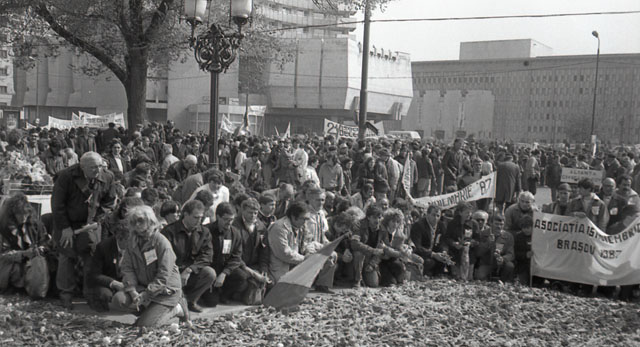
Golianad on University Square in 1990
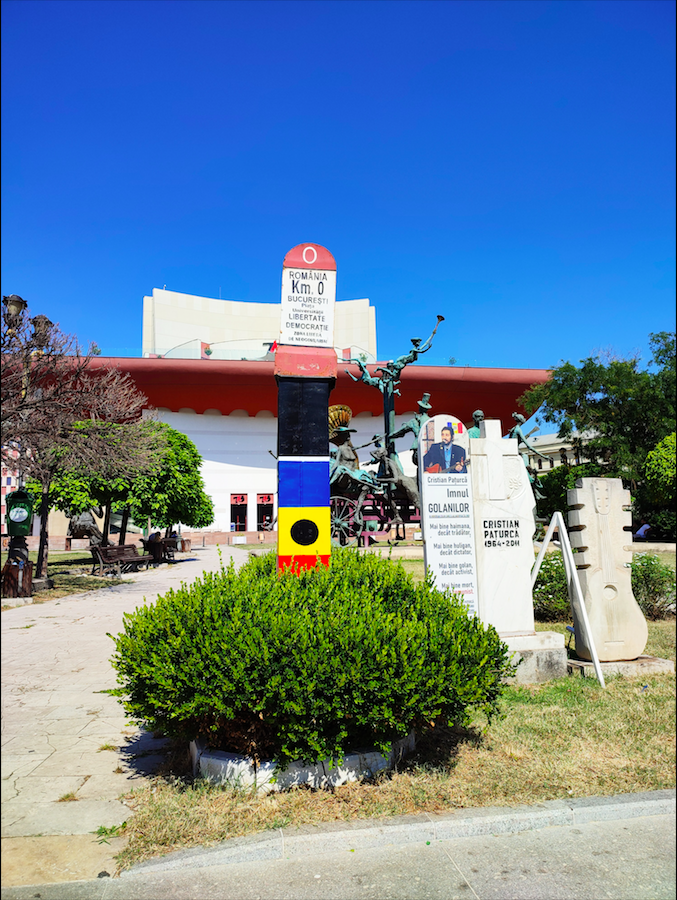
KM 0 of Democracy on University Square
Despite a traumatic failure, the phenomenon of University Square (or “Golaniada”) was, as Ruxandra Cesereanu remarks in an editorial in magazine 22, “the most radical and moral anti-communist discourse of civil society after the fall of the Ceausescu dictatorship in Romania” . The long occupation of the University Square, which began on April 22, 1990, would eventually be isolated and marginalized by the pressures and manipulations of power. After the May elections, most informal groups of protesters who had participated in the creation of the “first free zone of neo-communism” withdrew. The extra-parliamentary opposition had realized that its appeal to wider segments of the population would require a lasting effort. The leadership of the National Salvation Front (FSN), a revolutionary emanation body that became a political party, constantly refused dialogue with representatives of civil society in University Square and continued to present the Square as a form of “social crime.”
On June 13, under the pretext of clearing the Square, police troops began evacuating the last demonstrators, including a number of hunger strikers. Instead of a legal (and as peaceful as possible) solution to the conflict between civil society and political power, the FSN government called on extra-legal forces and, on the morning of June 14, thousands of miners from the Jiu Valley arrived in Bucharest to ” restore order ”.
For two days, the country’s capital would experience a real terror, with groups of miners patrolling the city’s streets, devastating the headquarters of independent parties, molesting and attacking all those who seemed to be engaged in anti-FSN actions. Leaders of the student movement, teachers, intellectuals, women and men alike, ordinary citizens of the capital, were beaten and tortured. The pro-government press responded to the opposition’s actions with insinuating and defamatory articles. In the words of one of the most important voices of the Romanian anti-communist exile (Monica Lovinescu), mining was “the expression of the cynical recourse of the nomenclature to the tactics of fratricide”.
One of the many lessons of the University Square phenomenon is that higher education institutions play an essential role in the life of the city. They contribute to what is called the socialization of elites, coagulate and legitimize the voices of political criticism, define and disseminate values. As a community of those responsible for the destinies of higher education, the university embodies the Humboldtian ideal of academic freedom and institutional autonomy. Indeed, with regard to the state’s presence in science and education, the German philosopher considered that it should deal exclusively with the formal organization of the university, any other influence being simply unacceptable and harmful to knowledge. From this point of view, communist regimes distinguished themselves by treating universities as centers of indoctrination and subordination of education to ideological imperatives.
Meditating on the tribulations of the Romanian transition to democracy, the University of Bucharest proposes an essential collective memory exercise about “University Square at 30 years old”. Strictly speaking, it is about reaffirming the public vocation of the university in the public space. The project is also intended to be an act of moral reparation for victims of violent repression in the summer of 1990, as well as an invitation to dialogue and introspection addressed to academic and civil society as a whole. Associated, from the first moment, with the symbolism of “Kilometer 0 of Romanian democracy”, the University of Bucharest invites, therefore, a careful, informed and civilized public discussion about the “University Market Phenomenon” as an expression of the ethos of a civil society that rose against complicity , cynicism and capitulation.
Some impressions from our Dome Talk

